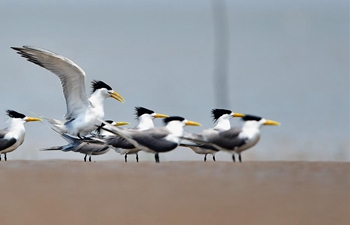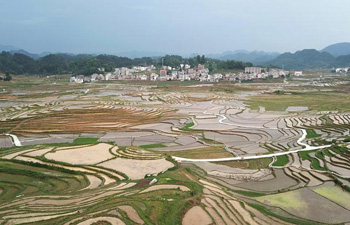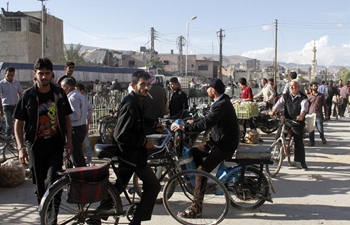BEIJING, May 14 (Xinhua) -- Taking the subway, eating breakfast in restaurants, walking through community parks or passing by school gates during rush hour, silver-haired elderly holding hands with toddlers or elementary students can be seen everywhere in Chinese cities.
In China, where most young women have jobs, children are usually looked after by their grandparents. When many ambitious young Chinese flow into the big cities to earn a living, their parents often join them to help with the childcare.
According to a report in Monday's People's Daily, figures from China's National Health Commission showed that China had 18 million elderly migrants and about 43 percent of them have moved in order to take care of their grandchildren.
Ms. Chen, 64, is one of them. In Guiyang, capital of southwest China's Guizhou Province, she wakes up at five every morning to visit the market and then begin preparing the daily meals for her son, daughter-in-law, and grandson.
Chen, who moved to the city three years ago after retirement, also walks with her grandson between kindergarten and home in the morning, at lunchtime, and in the afternoon.
"I get tired," she admitted, "but I am happy at the same time to be with my family and watch my grandson grow up day by day."
An important reason behind this huge migrant population is an aspect of traditonal Chinese culture in which generations are closely connected and grandparents are deeply involved in the care of young children.
Many Chinese seniors urge their children to have children immediately after marriage, saying "have a baby while we can still help."
The number of elderly migrants is expected to increase as the country has eased its family planning policy in recent years, allowing and encouraging young couples to have two children.
Due to the decades-long one-child policy, a typical Chinese family living in urban areas usually includes four grandparents, two parents, and one or two grandchildren.
While many senior citizens leave their hometowns to look after their grandchildren, others head to cities so that their family can look after them.
Zhang Fenglian, demography researcher at Shandong Academy of Social Sciences said that, other than offering help, many Chinese seniors move to the city because living with their middle-aged children improves their quality of life.
China has an aging population. The number of people aged over 60 reached 230 million, or 16.7 percent of the country's total population, at the end of 2016.
As many elderly migrants moving to the cities come from smaller cities or rural areas, they faces challenges including generation gaps, strange and indifferent communities, and a lack of friends and extended family.
City governments and nursing institutions in many places have realized the urgent need to help these new urban residents settle and are organizing more cultural and entertaining activities and classes to help the aged fit in.
"It is all about the sense of belonging," said social worker Miao Yanmei, also a scholar with Beijing City University, "the earlier they adjust to the new community and city, the less problems they'll have in the future."
Experts have also called on local governments to supply more public services and medical support for elderly migrants.

















